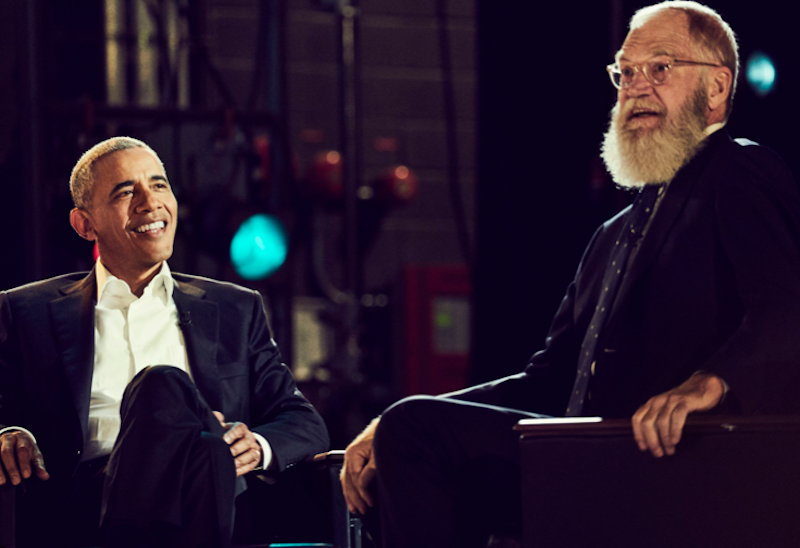The false prophet of the airwaves wears the weather on his face. A nimbostratus cloud of beard colors his skin white and gray as he waxes penitent and pathetic before a series of mononymous stars as cold and dim as any M-type in heaven; as the man on-screen is a former weatherman—a reader of cue cards—named David Letterman, the underground man of war and the “Forty Foot Man” of song; the man with four seasons on Netflix, and the host of Bono and the Edge’s homecoming on Disney+.
The Netflix show, My Next Guest Needs No Introduction, celebrates the likes of Obama, Clooney, Kanye, Ellen, Zelensky, and (Melinda) Gates.
The interview with Obama sets the tone, or rather the interview’s a set piece in which Letterman atones for his absence from history, and asks the former president (who was three at the time) why he, Letterman, was not in Selma on March 7, 1965.
Absent absolution from God, Letterman seeks the next best thing: a pardon of presidential forgiveness.
Absent Obama’s power to prevail upon the waters and pass over the earth, lowering the oceans and healing the planet, he has no civilian authority to grant reprieves and pardons.
He does, however, have the power to play his part: settling the question for good—that there’s neither slave nor master, for all are free.
But if no razor shall come upon Letterman’s beard, and if he insists on looking like John Brown and reenacting the raid at Harpers Ferry, Obama has no duty to play along.
We have no duty to watch either, because the sight of Letterman walking across the Edmund Pettus Bridge with Congressman John Lewis is too much.
The crossing is no baptism by fire, or by fire hoses strong enough to repel bodies and rip bark from trees, in which the world may note and long remember the starkness of a battle between blacks and whites—in black-and-white.
The crossing is instead a walking tour through the emptiness of Letterman’s mind, where his impression of Selma differs from his image of Selma.
His main impression is how nice the people are.
Perhaps he should do his own homecoming via the Crossroads of America, forgoing the desert—and the desert songs of The Joshua Tree—for the fiery cross of the Ku Klux Klan in Indiana.
Perhaps Letterman’s next guest should be an optometrist, because he’s unaware of the beam—the glaring plank—of irony in his own eye.
That he looks like a cross between a prisoner of war and the personification of the cross isn’t a good sign.
Not until he speaks does he reveal the full import of his idiocy, of stupefaction before the obvious and ignorance of the highest truth, rendering his interview with Volodymyr Zelensky worthless.
The segment is a slow descent into darkness, an escalator ride into a bunker of a subway station, where Letterman plays the fool.
The placement of the chairs, the positioning of the cameras, the lighting of the stage, the stairway leading to a light at the end of the tunnel—all this is as spontaneous as Letterman’s monologue.
Despite all this, good words and fair speeches are no match for wisdom and grace.
Virtue lies in the will of conscience and the vigilance of truth.

